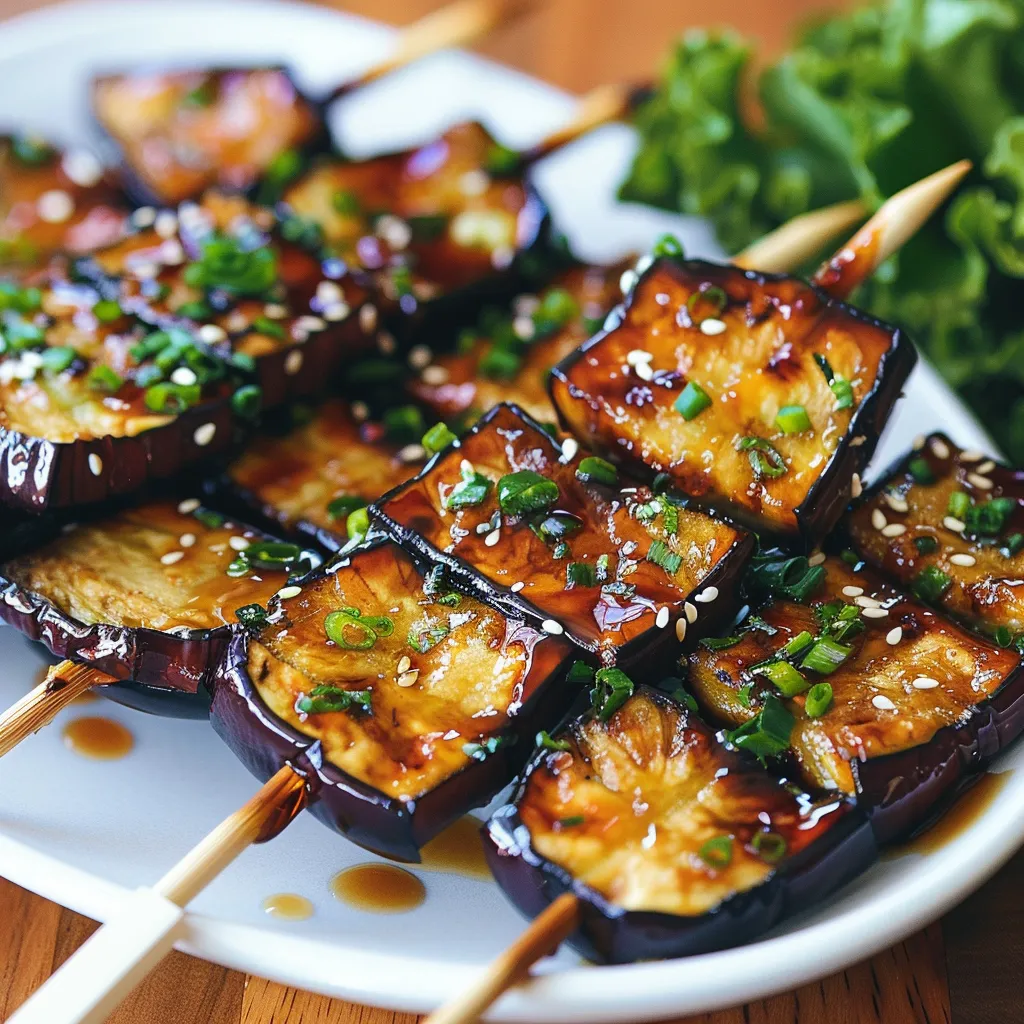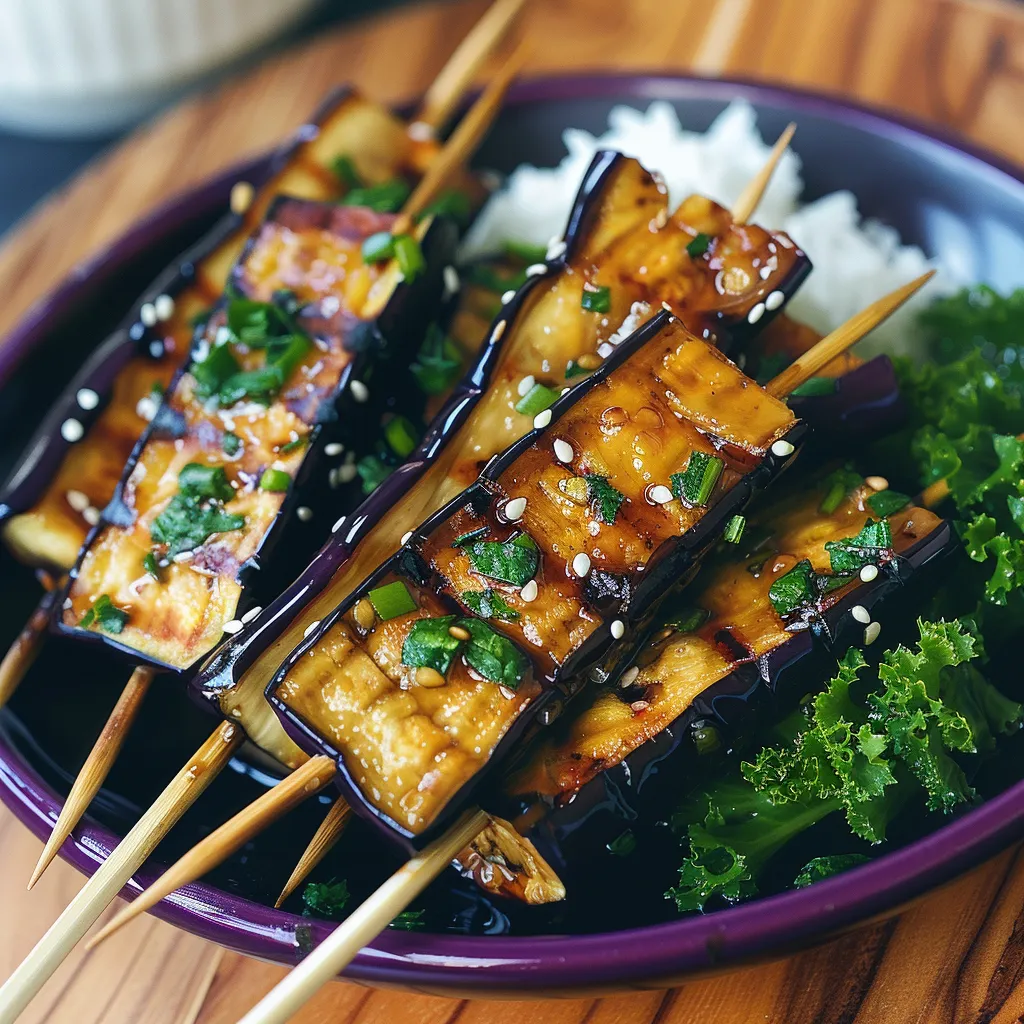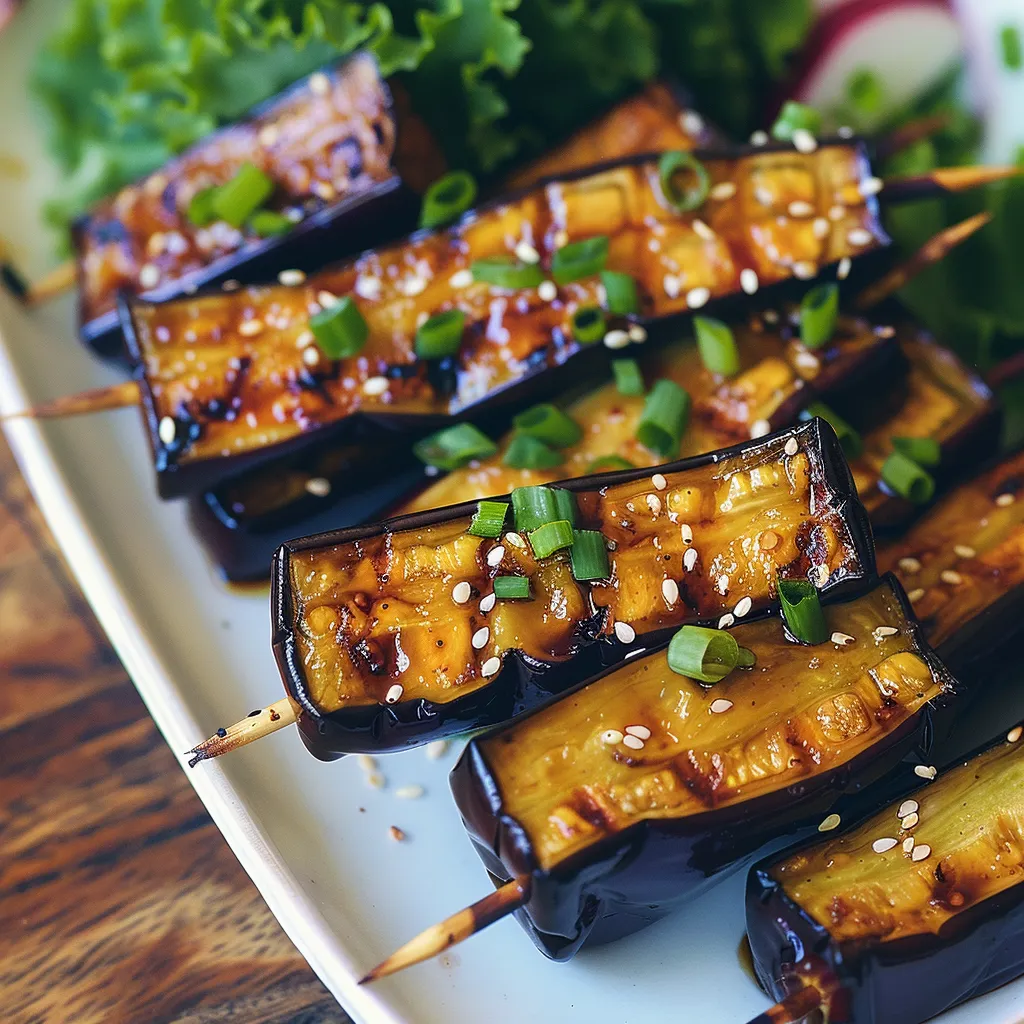 Pin to Favorites
Pin to Favorites
This miso glazed eggplant skewer recipe transforms humble eggplant into a caramelized, umami-packed delight that will impress even the most devoted meat eaters. The sweet-savory glaze creates an irresistible crust on the tender eggplant, making this dish a standout addition to any meal.
I discovered this recipe during my exploration of Japanese cooking techniques and it quickly became my go-to impressive appetizer for dinner parties. The combination of miso's depth with the eggplant's silky texture never fails to generate recipe requests.
Ingredients
- Japanese eggplant: Longer and more slender than regular eggplant with fewer seeds and a creamier texture when cooked
- White miso paste: Provides the signature umami foundation; look for organic varieties for best flavor
- Rice vinegar: Adds brightness and balances the richness of the miso
- Toasted sesame oil: Contributes nutty complexity; just a small amount transforms the dish
- Tamari or soy sauce: Enhances the savory notes; choose low-sodium varieties to control saltiness
- Honey or maple syrup: Creates caramelization and balances miso's saltiness
- Fresh ginger: Adds a subtle warmth and aromatic quality
- Toasted sesame seeds: Provide textural contrast and visual appeal
- Scallions: Bring freshness and a mild onion flavor to finish the dish
Step-by-Step Instructions
- Preheat and Prep:
- Heat your oven to 400°F while soaking wooden skewers in warm water for at least 10 minutes. This prevents the skewers from burning in the oven and ensures they remain intact throughout cooking. Use warm rather than cold water to speed up the soaking process.
- Eggplant Preparation:
- Cut each Japanese eggplant in half lengthwise then slice into 3/4-inch half moons. This size allows the eggplant to cook through while maintaining its shape. Thread pieces onto skewers leaving small gaps between each piece to ensure even cooking and proper glazing later. The gaps allow heat circulation and provide space for the glaze to coat each piece thoroughly.
- First Bake:
- Arrange the skewers on a parchment-lined baking sheet with the skin side facing up. Brush all surfaces generously with grapeseed oil which helps prevent sticking and promotes browning. Bake for 30 to 35 minutes until the eggplant becomes tender and the skin develops a beautiful brown color. The extended baking time allows the eggplant to fully soften while concentrating its natural flavors.
- Glaze Creation:
- While the eggplant bakes whisk together white miso paste, rice vinegar, sesame oil, tamari, honey, and grated ginger until completely smooth. This combination creates a perfect balance of umami, sweetness, acidity, and aromatic notes. The honey helps the glaze caramelize beautifully while the ginger adds a gentle heat that complements the miso.
- Final Glazing and Baking:
- Once the initial baking is complete flip the skewers so the skin faces downward. Apply a generous coating of miso glaze to the exposed flesh ensuring it gets into all the crevices. Return to the oven for about 10 minutes until the glaze bubbles and begins to caramelize. This final baking step transforms the glaze into a sticky lacquered coating that defines this dish.
 Pin to Favorites
Pin to Favorites
My favorite element of this recipe is the remarkable transformation of the miso glaze under heat. The first time I made these for my Japanese friend she complimented how perfectly the glaze achieved what's called "umami blistering" a technique her grandmother used to impart maximum flavor to vegetables.
Make Ahead Options
This dish offers excellent flexibility for entertaining. You can complete the first baking step up to a day ahead then refrigerate the partially cooked skewers. When ready to serve simply bring them to room temperature, apply the glaze, and complete the final baking step. The glaze can also be prepared up to three days in advance and stored in an airtight container in the refrigerator. This approach actually enhances the flavor as the ingredients have time to meld together.
Serving Suggestions
These miso glazed eggplant skewers pair beautifully with fluffy jasmine rice which absorbs the extra glaze. For a complete meal consider adding a protein element like grilled tofu or chicken thighs seasoned with similar Asian flavors. The skewers also work wonderfully within a larger Japanese-inspired spread including miso soup, edamame, and pickled vegetables. For an elegant presentation remove the skewers before serving and arrange the glazed eggplant pieces over a bed of rice garnished with additional scallions.
Cultural Context
This recipe draws inspiration from Japanese nasu dengaku, a traditional dish where eggplant halves are broiled and topped with a sweet miso glaze. The skewer presentation modernizes this classic preparation while maintaining its essential flavor profile. Miso has been a cornerstone of Japanese cuisine for centuries, valued not only for its distinctive taste but also for its nutritional benefits. By incorporating this fermented ingredient, you're connecting with an ancient culinary tradition that celebrates simple ingredients transformed through thoughtful preparation.
 Pin to Favorites
Pin to Favorites
Enjoy these miso glazed eggplant skewers as a delightful fusion of tradition and modern presentation that's sure to impress your guests.
Frequently Asked Questions
- → Can I use regular eggplant instead of Japanese eggplant?
Yes, you can substitute Japanese eggplants with regular eggplants. However, ensure to cut them into smaller, uniform pieces for even cooking.
- → Can I make these skewers on a grill instead of baking?
Absolutely! Just preheat your grill to medium heat, oil the grates, and cook the skewers for 4-6 minutes per side, brushing on the glaze during the last few minutes.
- → What is tamari, and can I use soy sauce instead?
Tamari is a gluten-free soy sauce. If gluten isn't a concern, you can easily replace it with regular soy sauce without altering the flavor significantly.
- → Can I make the miso glaze ahead of time?
Yes, the miso glaze can be prepared a day or two in advance. Store it in an airtight container in the refrigerator and give it a good mix before using.
- → What sides pair well with these eggplant skewers?
Steamed jasmine rice and a refreshing kale seaweed salad are excellent sides. You can also try pairing them with soba noodles or a light cucumber salad for a complete meal.
- → Can I use maple syrup instead of honey?
Yes, maple syrup is a great substitution for honey, offering a similar sweetness that complements the glaze beautifully.
- → Can I make this dish vegan?
To make the dish vegan, substitute honey with maple syrup or agave syrup. The rest of the ingredients in this dish are plant-based.
